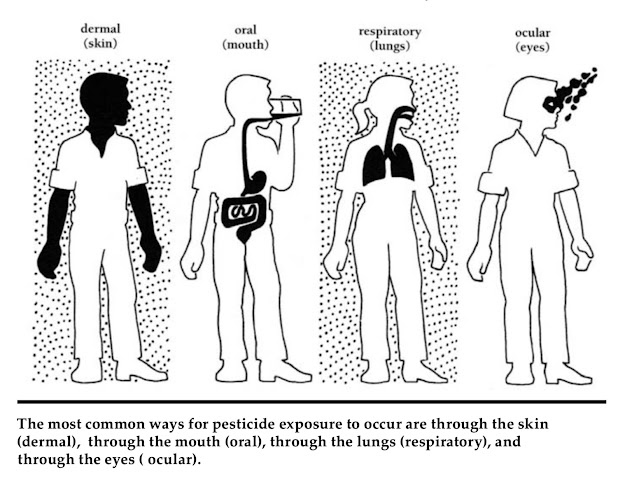
Be careful around garden chemicals; important safety tips to remember

|
| (Illustration courtesy UC Integrated Pest Management, Pest Note 74126) |
Pesticides can do more than kill unwanted insects; they can harm you, too.
Cherry Hoover found that out the hard way while cleaning out her garage. That included pesticides, miticides, insecticides, herbicides, fungicides and other chemical cures that had accumulated over several years. (Remember: The suffix “cide” means “killer.”)
Hoover is president of the Sacramento Floral Design Guild and a national award-winning rose exhibitor and arranger. She has been a dedicated gardener most of her life. She’s handled lots of garden chemicals.
But she let her guard down while packing up boxes of old chemical containers.
“I thought I was doing the right thing,” Hoover recalled. “I almost lost my sight in one eye.”
The culprit: Her cellphone. Hoover had her phone with her while she was working. “I somehow got some chemicals on my hands and then got them on my phone,” she recalled. “Then, I touched my phone (without gloves) and must have touched my face.”
Specks of the unidentified chemical managed to migrate into her eye.
“My eye was paralyzed,” said Hoover, who had to go to the emergency room. “My pupil was frozen open for nearly two weeks. My doctor wasn’t sure it would ever go back (to normal). I couldn’t sleep. It was terrible.”
Fortunately, it was a small enough amount that its effects eventually wore off and Hoover’s eye returned to normal. But her experience was a cautionary reminder: Be extremely careful and alert when handling dangerous chemicals.
“The dumbest things can get you,” said Jolene Adams, former president of the American Rose Society. For local rose clubs, Adams recently led a workshop on chemical safety, her specialty.
Dangerous chemicals can be absorbed quickly, almost instantly, through our skin, nose, mouth and eyes.
“Dermal – through your skin – is the most common,” Adams explained. “You can accidentally splash something on your skin or pick something up.”
Nose and eyes often are overlooked as pathways for chemicals to enter our bodies, Adams noted. “The moist skin inside your nose loves to attract dust. Your eyes are very sensitive.”
When handling any chemicals, wear protection, she said.
“Use chemical-resistant gloves – not vinyl, not rubber, not hospital gloves,” Adams said. “Chemicals will go right through most household or vinyl gloves. But don’t stop there. Wear chemical-resistant shoes, too; not tennis shoes and definitely not sandals.”
Adams also urged the use of safety goggles, a face shield, a hat and a respirator. Use a N-95 facemask at a minimum. She recommends use of protective clothing such as disposable paper coveralls. Always wear long sleeves and pants when working with chemicals.
Better yet, use fewer chemicals. Wean your garden off pesticides and herbicides. Most problems can be solved by other means, such as integrated pest management, she noted.
When you do buy chemicals, buy the smallest amount – not the largest package, Adams said.
“Never bulk-buy garden chemicals,” she said. “They degrade over time. If you buy less, you have less to get rid of later.”
Never pour chemicals down the drain or mix them together, she added. Always keep them in their original containers with all the warning labels. When disposing of them, do it properly via your city or county’s waste disposal services.
And just in case, memorize the emergency number for Poison Control: 1-800-222-1222.
An excellent guide to pesticide use and safety from the UC Integrated Pest Management system can be found in Pest Note 74126 .
Comments
0 comments have been posted.Sacramento Digs Gardening to your inbox.
Sites We Like
Garden Checklist for week of April 21
This week there’s plenty to keep gardeners busy. With no rain in the immediate forecast, remember to irrigate any new transplants.
* Weed, weed, weed! Get them before they flower and go to seed.
* April is the last chance to plant citrus trees such as dwarf orange, lemon and kumquat. These trees also look good in landscaping and provide fresh fruit in winter.
* Smell orange blossoms? Feed citrus trees with a low dose of balanced fertilizer (such as 10-10-10) during bloom to help set fruit. Keep an eye out for ants.
* Apply slow-release fertilizer to the lawn.
* Thoroughly clean debris from the bottom of outdoor ponds or fountains.
* Spring brings a flush of rapid growth, and that means your garden is really hungry. Feed shrubs and trees with a slow-release fertilizer. Or mulch with a 1-inch layer of compost.
* Azaleas and camellias looking a little yellow? If leaves are turning yellow between the veins, give them a boost with chelated iron.
* Trim dead flowers but not leaves from spring-flowering bulbs such as daffodils and tulips. Those leaves gather energy to create next year's flowers. Also, give the bulbs a fertilizer boost after bloom.
* Pinch chrysanthemums back to 12 inches for fall flowers. Cut old stems to the ground.
* Mulch around plants to conserve moisture and control weeds.
* From seed, plant beans, beets, cantaloupes, carrots, corn, cucumbers, melons, radishes and squash.
* Plant onion sets.
* In the flower garden, plant seeds for asters, cosmos, celosia, marigolds, salvia, sunflowers and zinnias.
* Transplant petunias, zinnias, geraniums and other summer bloomers.
* Plant perennials and dahlia tubers for summer bloom.
* Mid to late April is about the last chance to plant summer bulbs, such as gladiolus and tuberous begonias.
* Transplant lettuce seedlings. Choose varieties that mature quickly such as loose leaf.